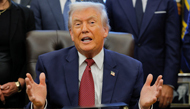Where Schools Fail, Madrasas Fill Void and Spur Militancy
THE ELEMENTARY SCHOOL in this poor village is easy to mistake for a barn. It has a dirt floor and no lights, and crows swoop through its glassless windows. Class size recently reached 140, spilling students into the courtyard.
But if the state has forgotten the children here, the mullahs have not. With public education in a shambles, Pakistan’s poorest families have turned to madrasas, or Islamic schools, that feed and house the children while pushing a more militant brand of Islam than was traditional here.
The concentration of madrasas in southern Punjab has become an urgent concern in the face of Pakistan’s expanding insurgency. The schools offer almost no instruction beyond the memorizing of the Koran, creating a widening pool of young minds that are sympathetic to militancy.
In an analysis of the profiles of suicide bombers who have struck in Punjab, the Punjab police said more than two-thirds had attended madrasas.
“We are at the beginning of a great storm that is about to sweep the country,”said Ibn Abduh Rehman, who directs the Human Rights Commission of Pakistan, an independent organization.“It’s red alert for Pakistan.”
President Obama said in a recent news conference that he was “gravely concerned”about the situation in Pakistan, not least because the government did not“seem to have the capacity to deliver basic services: schools, health care, rule of law a judicial system that works for the majority of the people.”He has asked Congress to more than triple assistance to Pakistan for nonmilitary purposes, including education. Since the September 11 attacks, the United States has given Pakistan $680 million in nonmilitary aid, according to the State Department, far lower than the $1 billion a year for the military.
But education has never been a priority here. Pakistan’s current plan to double education spending next year might collapse as have past efforts, which were thwarted by sluggish bureaucracies, unstable governments and a lack of commitment by Pakistan’s governing elite to the poor.
“This is a state that never took education seriously,”said Stephen P. Cohen, a Pakistan expert at the Brookings Institution, an independent research institute.“I’m very pessimistic about whether the educational system can or will be reformed.”
Pakistani families have long turned to madrasas, and the religious schools make up a relatively small minority. But even for the majority who attend public school, learning has an Islamic bent. The national curriculum was Islamized during the 1980s under General Mohammad Zia ul-Haq, a military ruler who promoted Pakistan’s Islamic identity as a way to bind its patchwork of tribes, ethnicities and languages.
Literacy in Pakistan has grown from barely 20 percent at independence 61 years ago, and the government recently improved the curriculum and reduced its emphasis on Islam.
But even today, only about half of Pakistanis can read and write, far below the proportion in countries with similar per-capita income, like Vietnam. One in three school-age Pakistani children does not attend school, and of those who do, a third drop out by fifth grade, according to Unesco. Girls’enrollment is among the lowest in the world, lagging behind Ethiopia and Yemen.
“Education in Pakistan was left to the dogs,”said Pervez Hoodbhoy, a physics professor at Quaid-e-Azam University in Islamabad who is an outspoken critic of the government’s failure to stand up to spreading Islamic militancy.
This impoverished expanse of rural southern Punjab, where the Taliban have begun making inroads with the help of local militant groups, has one of the highest concentrations of madrasas in the country.
Of the more than 12,000 madrasas registered in Pakistan, about half are in Punjab. Experts estimate the numbers are higher: when the state tried to count them in 2005, a fifth of the areas in this province refused to register.
Though madrasas make up only about 7 percent of primary schools in Pakistan, their influence is amplified by the inadequacy of public education and the innate religiosity of the countryside, where two-thirds of people live.
The phenomenon began in the 1980s, when General Zia gave madrasas money and land in an Americansupported policy to help Islamic fighters against the Soviet forces in Afghanistan.
The Islamic schools are also seen as employment opportunities. “When someone doesn’t see a way ahead for himself, he builds a mosque and sits in it,”said Jan Sher, whose village in Punjab, Shadan Lund, has become a militant stronghold, with madrasas now outnumbering public schools.
Even if the madrasas do not make militants, they create a worldview that makes militancy possible.“The mindset wants to stop music, girls’schools and festivals,”said Salman Abid, a social researcher in southern Punjab.“Their message is that this is not real life. Real life comes later”- after death.
Abed Omar, 24, had little religious education before he was inspired by a sermon at a seminary in Kabirwala run by adherents (called Deobandi) of an ultra-Orthodox Sunni school of thought that opposes music and festivals.
Restless and unfulfilled, Mr. Omar joined a conservative Islamic group, paying about $625 to travel with them around the country for four months on a preaching tour. The group, Tablighi Jamaat, taught him that Islam forbids music and speaking with women. American officials suspect that the group is a steppingstone to the Taliban. Pakistani officials say it is peaceful.
Now, when Mr. Omar visits his friends,“they turn off their tape players and give me their seat,”he said.
“I want to make everyone a preacher of Islam,”Mr. Omar said brightly, eating honey-soaked fritters in his family’s sweets shop.
He knows about 100 people in his town who have done a four-month tour like his. As for those who sign up for less, he said“they are countless.”
Waqar Gillani contributed reporting from Mohri Pur and Lahore, Pakistan.
스마터리빙
more [ 건강]
[ 건강]이제 혈관 건강도 챙기자!
[현대해운]우리 눈에 보이지 않기 때문에 혈관 건강을 챙기는 것은 결코 쉽지 않은데요. 여러분은 혈관 건강을 유지하기 위해 어떤 노력을 하시나요?
 [ 건강]
[ 건강]내 몸이 건강해지는 과일궁합
 [ 라이프]
[ 라이프]벌레야 물럿거라! 천연 해충제 만들기
 [ 건강]
[ 건강]혈압 낮추는데 좋은 식품
[현대해운]혈관 건강은 주로 노화가 진행되면서 지켜야 할 문제라고 인식되어 왔습니다. 최근 생활 패턴과 식생활의 변화로 혈관의 노화 진행이 빨라지고
사람·사람들
more많이 본 기사
- 박나래, 매니저 괴롭히고 술자리 강요..갑질 폭로, 피소 “확인 중”
- 아시아나 운항 감편 LA-인천 하루 1편만
- [안팎으로 옥죄는 이민 단속] ICE 대대적 이민 단속 확대
- 로데오 갤러리아 건물주 ‘퇴거 통보 철회’
- 가주 등에 “푸드스탬프 지원 중단” 위협
- 故김새론 유족 측, 카톡 포렌식 자료 공개 “김수현과 미성년자 교제 확실”
- 트레이더조스 이어 코스코 토트백 ‘열풍’
- “AI 첨단기술로 한인타운 치안 강화”
- [안팎으로 옥죄는 이민 단속] ‘입국금지국’ 이민 전면 중단
- 부친 흉기살해 아들, 경찰 총에 사망
- 무인택시 웨이모 ‘아찔’… 경찰 대치현장 난입
- 진짜 몰라보겠다.. ‘미우새’ 홍진영 근황
- 우리 식탁과 주변의 보이지 않는 독성 물질, 프탈레이트
- 뜨거운 커피·국물 좋아하세요?… 자칫 식도암 위험
- 우크라 종전 협상 ‘빈손’ 푸틴… “유럽과 전쟁도 불사”
- 79세 영국 귀족 공개구혼 ‘시끌’ 2
- 멈춰가는 심장에 초소형 펌프 ‘임펠라’ 시술 성공
- ‘공립 프리스쿨’ 확대에 민간 시설 폐업 속출
- 저속 인생
- ‘전국 최다 해고’… 가주 경제 부진 지속
- 시민권자 이중국적 금지 추진⋯한인 복수국적자 ‘촉각’
- 매튜 페리에 케타민 공급 의사 징역 2년6개월형
- 델 창업자, 63억달러 ‘통 큰 기부’
- 이번엔 ‘고가 금품 의혹’ 김건희, 특검 출석…8번째 대면조사
- ICE, 임신부 여성들도 체포·구금해 논란
- 주택보험료 2년간 16% 급등… 소유주들 ‘허리 휜다’
- 한국경찰청, 대니얼 이 경관에 감사장
- 외교부 예산 15% 줄어 재외공관 예산은 증액
- 윤정수♥원진서 결혼식 ‘미공개 컷’ … 1
- [열린송현] ‘100년 만에 재설계’ 미 증시서 배우자
- 브라질서 “한국오빠와 데이트” 사이트 주의보… ‘성착취 혐의’ 수사
- 볼티모어 주민 1천명, 집에서 쫓겨날 위기
- 한인, 시애틀 시정부 2인자 됐다
- EU 전 외교수장 부패 스캔들 체포
- 메트로시티 은행, 남가주 영업망 확장 ‘잰걸음’
- 홍명보 감독, 조추첨 참석차 미 도착… “최상 시나리오 예측불가”
- “새인가, 비행기인가?”… 상공서 집 찍는 ‘AI 풍선’ 등장
- 방탄소년단, 스포티파이 정상..글로벌 K팝 최다 스트리밍
- 연방의회, ‘승인없는 베네수 공격금지’ 결의안 추진
- 트럼프 ‘쓰레기’ 모욕에도…소말리아 총리 “차라리 무대응”
- 스포티파이 인기 앨범 ‘케데헌’ OST 2위 올라
- [윌셔에서] 크리스마스와 쌀 한 포대
- 한미은행, 버몬트·세리토스 지점 40주년 기념
- 트럼프, 소말리아계 美의원에 “당장 쫓겨나야”…의원 “편협하다”
- [전문의 칼럼] 치질
- ‘즉시 입주 가능?’… 자칫 불량 ‘레몬 하우스’ 일 수도
- 美, 전문직 비자 심사 강화… “‘검열’ 관련 경력 있으면 부적격”
- 온라인상 괴롭힘·스토킹 혐의 뉴저지 30대 한인남성 체포
- 뉴욕총영사관 내년 1월부터 새 건물서 업무
- 옥스포드대 출판부 선정 올해의 단어 ‘분노 미끼’
1/5지식톡

-
 테슬라 자동차 시트커버 장착
0
테슬라 자동차 시트커버 장착
0테슬라 시트커버, 사놓고 아직 못 씌우셨죠?장착이 생각보다 쉽지 않습니다.20년 경력 전문가에게 맡기세요 — 깔끔하고 딱 맞게 장착해드립니다!장착비용:앞좌석: $40뒷좌석: $60앞·뒷좌석 …
-
 식당용 부탄가스
0
식당용 부탄가스
0식당용 부탄가스 홀세일 합니다 로스앤젤레스 다운타운 픽업 가능 안녕 하세요?강아지 & 고양이 모든 애완동물 / 반려동물 식품 & 모든 애완동물/반려동물 관련 제품들 전문적으로 홀세일/취급하는 회사 입니다 100% …
-
 ACSL 국제 컴퓨터 과학 대회, …
0
ACSL 국제 컴퓨터 과학 대회, …
0웹사이트 : www.eduspot.co.kr 카카오톡 상담하기 : https://pf.kakao.com/_BEQWxb블로그 : https://blog.naver.com/eduspotmain안녕하세요, 에듀스팟입니다…
-
 바디프렌드 안마의자 창고 리퍼브 세…
0
바디프렌드 안마의자 창고 리퍼브 세…
0거의 새제품급 리퍼브 안마의자 대방출 한다고 합니다!8월 23일(토)…24일(일) 단 이틀!특가 판매가Famille: $500 ~ $1,000Falcon: $1,500 ~ $2,500픽업 & 배송직접 픽업 가능LA…
-
 바디프렌드 안마의자 창고 리퍼브 세…
0
바디프렌드 안마의자 창고 리퍼브 세…
0거의 새제품급 리퍼브 안마의자 대방출 한다고 합니다!8월 23일(토)…24일(일) 단 이틀!특가 판매가Famille: $500 ~ $1,000Falcon: $1,500 ~ $2,500픽업 & 배송직접 픽업 가능LA…
케이타운 1번가
오피니언
 이상희 UC 리버사이드 교수 인류학
이상희 UC 리버사이드 교수 인류학 저속 인생
 클라라 원 대한인국민회 기념재단 이사장
클라라 원 대한인국민회 기념재단 이사장 [기고] 중가주 사적지 역사탐방을 마치고
 김승연 넥스트증권 대표
김승연 넥스트증권 대표 [열린송현] ‘100년 만에 재설계’ 미 증시서 배우자
 성민희 소설·수필가
성민희 소설·수필가 [윌셔에서] 크리스마스와 쌀 한 포대
 양홍주 / 한국일보 논설위원
양홍주 / 한국일보 논설위원[지평선] 페트리 접시 속 아리아나 그란데

[왈가 왈부] 과학기술 기관장 줄줄이 공백… ‘과학 강국’은 헛구호인가요
 정숙희 논설위원
정숙희 논설위원윤이상, 상처입은 용
 파리드 자카리아 워싱턴포스트 칼럼니스트 / CNN ‘GPS’ 호스트
파리드 자카리아 워싱턴포스트 칼럼니스트 / CNN ‘GPS’ 호스트 미국에서 영감을 얻는 세계의 독재자들
 김동찬 시민참여센터 대표
김동찬 시민참여센터 대표 [미국은 지금] 라칸왈의 총성, 반이민의 쇄국 될까
1/3지사별 뉴스

KCS 커뮤니티센터에 엘리베이터 설치된다
뉴욕한인봉사센터(KCS)는 2일 퀸즈 베이사이드 KCS 커뮤니티센터내 엘리베이터 설치를 위한 뉴욕주정부 예산 200만달러를 확보했다고 밝혔다.…
시민권자 이중국적 금지 추진⋯한인 복수국적자 ‘촉각’

DC 시장 각축전…최소 9명 도전
내년 워싱턴 DC 시장 선거를 앞두고 최소 9명 이상 출마할 것으로 예상된다.지난달 25일 뮤리엘 바우저 시장의 불출마 선언으로 차기 DC 시…
마크 워너 VA 연방 상원의원 4선 도전

美, 전문직 비자 심사 강화… “‘검열’ 관련 경력 있으면 부적격”
트럼프 행정부가 전문직 취업비자인 H-1B 비자 신청자가 ‘온라인 검열’ 관련 업무를 하지 않았는지 확인하기 위해 심사 강화에 나섰다고 로이터…
SF 베이지역 한인회, ‘2025 송년 감사 갈라 음악회’

오늘 하루 이 창 열지 않음 닫기 





















































.png)


댓글 안에 당신의 성숙함도 담아 주세요.
'오늘의 한마디'는 기사에 대하여 자신의 생각을 말하고 남의 생각을 들으며 서로 다양한 의견을 나누는 공간입니다. 그러나 간혹 불건전한 내용을 올리시는 분들이 계셔서 건전한 인터넷문화 정착을 위해 아래와 같은 운영원칙을 적용합니다.
자체 모니터링을 통해 아래에 해당하는 내용이 포함된 댓글이 발견되면 예고없이 삭제 조치를 하겠습니다.
불건전한 댓글을 올리거나, 이름에 비속어 및 상대방의 불쾌감을 주는 단어를 사용, 유명인 또는 특정 일반인을 사칭하는 경우 이용에 대한 차단 제재를 받을 수 있습니다. 차단될 경우, 일주일간 댓글을 달수 없게 됩니다.
명예훼손, 개인정보 유출, 욕설 등 법률에 위반되는 댓글은 관계 법령에 의거 민형사상 처벌을 받을 수 있으니 이용에 주의를 부탁드립니다.
Close
x